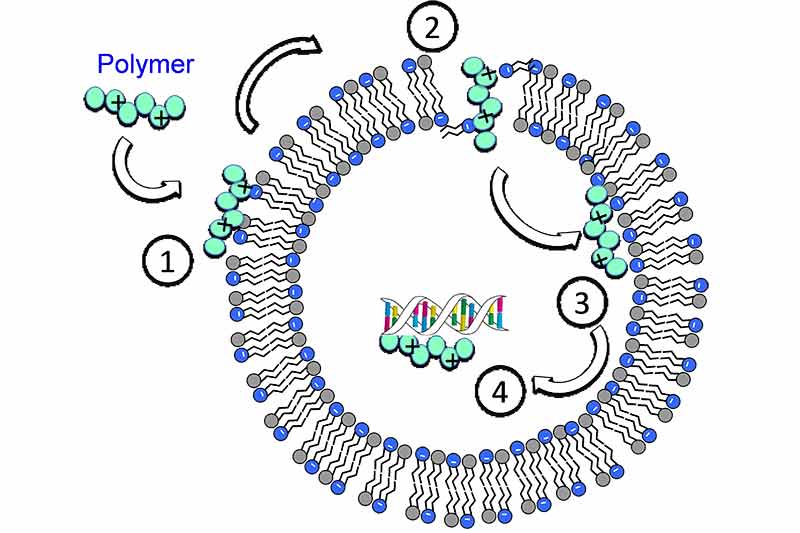
According a press
release from the Agency for Science, Technology and Research (A*STAR), an international
research team led by A*STAR’s Institute of Bioengineering and Nanotechnology (IBN) and IBM Research has developed a synthetic
molecule that can kill five deadly types of multidrug-resistant bacteria with
limited, if any, side effects. This study was also done in collaboration with
the University of North Dakota’s School of Medicine and Health Sciences, and
the First Affiliated Hospital of Zhejiang University’s College of Medicine.
The new material could be developed into an antimicrobial
drug to treat patients with antibiotic-resistant infections. This finding was
reported in the scientific journal Nature Communications.
Bacteria resistance to antibiotics presents a serious global
health threat. Bacteria are beginning to develop resistance to the last-line
antibiotics, which are given only to patients infected with bacteria resistant
to available antibiotics.
According to the UK Review on Antimicrobial Resistance,
superbugs kill around 700,000 people worldwide each year. By 2050, 10 million
people could die each year if existing antibiotics continue to lose their
effectiveness.
The alternatives to antibiotics being explored by the
research includes synthetic polymers. However, the antimicrobial polymers
developed so far are either too toxic for clinical use, not biodegradable or
can only target one type of bacteria.
To address this problem, Dr Yi Yan Yang from IBN brought
together a multidisciplinary research team from the US, China and Singapore to
develop a new class of antimicrobial polymers called guanidinium-functionalized
polycarbonates.
They feature a unique killing mechanism that can target a
broad range of multidrug-resistant bacteria. It is biodegradable and non-toxic
to human cells.
The polymer binds specifically to the bacterial cell and is then
transported across the bacterial cell membrane into the cytoplasm, where it
causes precipitation of the cell contents (proteins and genes), resulting in
cell death.
The team tested the polymers on mice infected with five
hard-to-treat multidrug-resistant bacteria: Acinetobacter baumannii, Escherichia coli, Klebsiella
pneumoniae, methicillin-resistant Staphylococcus aureu and Pseudomonas
aeruginosa. These superbugs commonly infect patients in the hospitals and can cause
systemic infections that lead to septic shock and multiple organ failure. The
results demonstrated that the bacteria were effectively removed from the mice
and no toxicity was observed.
The
researchers further tested the effectiveness of the polymers on mice with
two types of systemic infections caused by superbugs: peritonitis (an infection
of the stomach’s inner lining) and lung infections from Pseudomonas
aeruginosa. The polymers eliminated the bacterial infections in both groups
of mice with negligible toxicity.
To
determine whether the bacteria will develop any resistance to the polymer, the
team collaborated with Dr Paola Florez de Sessions at A*STAR’s Genome Institute
of Singapore and the Cell Engineering group of Dr Simone Bianco at IBM Research
– Almaden to perform genomic analysis. They found that the bacteria did not
show any resistance development even after multiple treatments with the
polymer.
Dr Yi Yan Yang, Group Leader at IBN said, “We have
demonstrated the first
example of a biodegradable synthetic macromolecule with broad-spectrum
antimicrobial activity in mice, unique killing mechanism and no toxicity. Once
the polymer finishes its job of killing the bacteria, it will be
naturally degraded after three days and will not remain in the
body. This antimicrobial agent shows great promise for the treatment and
prevention of multidrug-resistant systemic infections.”
“This study illustrates the potential for this new research
field we denote as ‘macromolecular therapeutics’ to create entirely new
classes of treatments for multiple diseases,” said Dr James Hedrick,
Distinguished Research Staff Member, IBM Research – Almaden, San Jose,
California. “In 2016, we demonstrated the efficacy of synthetic polymers to
combat deadly viral diseases. The current research for treating bacterial infections
rounds out our ability to someday treat a spectrum of infectious diseases with
a single, new type of mechanism without the onset of resistance,” he
added.
IBN and IBM are now seeking collaborations with
pharmaceutical companies to develop the polymers into an antimicrobial
treatment for patients.
















